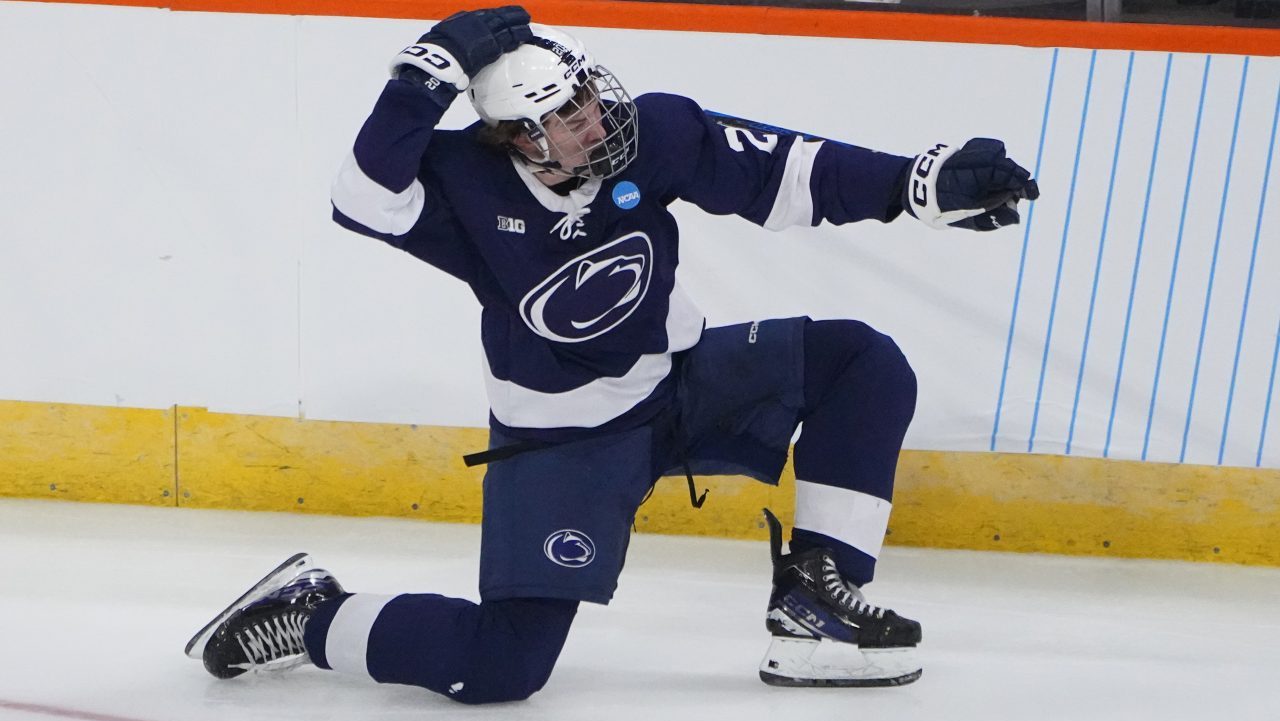
The crowd erupted inside the PPL Center last month when Penn State forward Matt DiMarsico punched his team’s ticket to its first Frozen Four with a game-winning overtime goal to defeat UConn in the regional final of the NCAA men’s hockey tournament.
It was pure pandemonium.
“I almost jumped out of my pants in utter excitement,” Penn State athletic director Patrick Kraft said in a phone interview. “I hit the roof of the suite that I was in.”
Kraft jumped into the arms of two nearby staffers inside his suite at the Allentown, Pa., arena before immediately making his way down to the ice to celebrate with players and coaches. As he exited the ice, Kraft sent an appreciation text to Terry and Kim Pegula, a power couple in the business and sports world who have deep ties to Penn State. Terry is a prominent alum and former Board of Trustees member.
The Pegula family amassed a fortune in the fracking business and is perhaps most known as the principal owners of the Buffalo Bills and the NHL’s Buffalo Sabres (along with tennis success). But Terry and Kim are also power players in central Pennsylvania’s hockey community.
The two have donated more than $100 million to Penn State hockey, helping Penn State go from club level to Division I varsity status in both men’s and women’s in a process that went official in 2012. Their original commitment of $88 million two years prior—the largest private gift in the university’s history—also funded the construction for a 6,000-seat ice hockey facility on campus (Pegula Ice Arena), which opened in 2013.
Penn State’s men’s team will face Boston University in the NCAA semifinals Thursday night in St. Louis. Back on campus in State College, Pa., the Pegula Ice Arena, which regularly sells out for hockey games, is hosting a free watch party as fans watch the Nittany Lions take on the Terriers for a spot in Saturday’s national championship.
“We really owe it to Terry, Kim and the family,” said Kraft, who noted the women’s team has also found success with three straight Big Ten conference titles. “The Pegulas did it not just for Penn State but for the hockey community in central Pennsylvania that needed a boost [then] and I think this will only accelerate that even more. … It’s not lost on me what they did to put us in this position … The Pegulas had a vision, and it got us here to where we are.”
The Penn State athletic department also credits former Penn State club ice hockey coach Joe Battista, a former school administrator who played a pivotal in securing the original donation from the Pegulas and oversaw the early development of the men’s and women’s D-I programs. The former sports executive was involved in the 2011 decision to hire former Princeton coach Guy Gadowsky as Penn State’s head coach.
Gadowsky overcame a 0-8 start in conference play this season to reach the Frozen Four.
“When you get to this level, it just elevates the entire department and all 31 sports,” Kraft said. “My phone exploded when that [DiMarsico] goal went in. It brings a community together. … We’re trying to win at everything, and it just perpetuates itself.”
Penn State men’s hockey reeled in $2.2 million in ticket sales during the 2023-2024 athletic year. That’s the second most of all sports behind Penn State football, which did more than $44 million in sales. Overall, men’s hockey ($4.6 million) drove the third-most revenue during that same time frame behind men’s basketball ($11.8 million) and football ($113 million).
While the Nittany Lions are making history on the ice, they aren’t expecting a direct windfall for their postseason run. Men’s college hockey does not carry the revenue potential of football or basketball, where men’s and women’s basketball programs can secure money paid to their respective conference for advancing in the NCAA Tournament.
As a result, Penn State hockey will continue to be reliant on enhanced donor support, especially as a U.S. district judge considers final approval of a landmark settlement that will introduce athlete revenue sharing to college athletics. Schools like Penn State, if approved, will be permitted to pay athletes directly by distributing from a pool of about $20 million for the 2025-2026 athletic year.
“Our donors are going to be more important than ever right now,” Kraft said. “When you can rally a community and get everyone fired up, it’s good for the entire department. This is just another one of those great moments in Penn State athletics history.”

